#eddard meta
Explore tagged Tumblr posts
Text
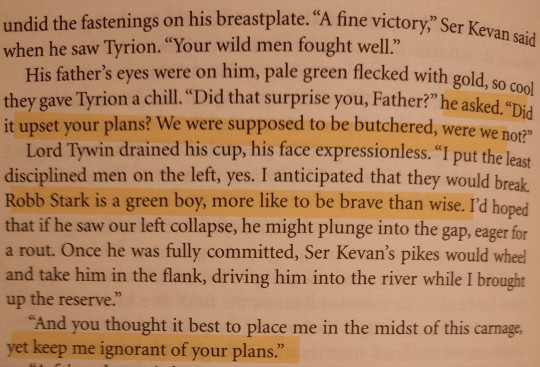
the battle between the starks and the lannisters at the twins in got is actually a battle between the parenting of ned stark and tywin lannister.
this is the first battle to which tyrion brings his vale mountain clan soldiers and tywin places him in the left vanguard, essentially as a diversion/sacrifice. he does not share his strategy, as outlined above, with tyrion because he claims he doesn't 'trust' him. he assumes tyrion will fail and so when he succeeds, it upsets his plans.
he expects as little from robb stark, an untried boy. but what he doesn't understand is that ned has prepared his son for leadership. he hasn't hoarded his authority from him, desperate for dominance over everyone including his family. he's brought robb with him when he carried out his duties as a lord. he's educated him in battle strategy but more importantly, he has not glamorised war to him. robb is not eager to go plunging into battle and he's not battling for the sake of it. he knows the burden of his responsibility as a lord and he even knows when to delegate it: tywin's first shock was that the freys were in the stark host because robb trusted his mother to negotiate a hard bargain on his behalf. all of this contrasts tywin's neglect of tyrion and even his adulation of jaime's prowess - in the same chapter before the battle, he admonishes tyrion: "does the thought of facing the stark boy unman you, tyrion? your brother jamie would be eager to come to grips with him." ironically the kind of foolhardy behaviour he expects and criticises from robb, he encourages in jaime. this is because tywin doesn't actually want an heir to succeed his rule, he wants a shiny trophy to flatter it. only of course, tywin is not immortal. as this chapter foreshadows, his inability to parent or relinquish any power will be his undoing.
#grrm the author you are#how do you turn an actual battleground into an ideological battleground of fatherhood??#freud will be having words#asoiaf#asoiaf meta#got#game of thrones#a song of ice and fire#tywin lannister#tyrion lannister#robb stark#ned stark#eddard stark#catelyn stark#house lannister
1K notes
·
View notes
Text
If there is one line I like to over-analyze in the ASoIAF books it is a rather famous thought that goes inside Cat's head before her death. As the steel is close to her throat Cat thinks "No, don’t, don’t cut my hair, Ned loves my hair." And this line and her entire inner monologue is absolutely heart-breaking but one thing I fixate on is the actual sentence itself.
"Ned loves my hair."
Anyone who has read the books knows that Cat holds contempt for the fact that except for Arya, she has failed to give Ned children who look like him. It is also one of the reasons she dislikes Jon so much, because the mother of Jon (who she assumes to be Ned's bastard son) has managed to give Ned a child that looks just like him while she, his lawfully wedded wife gave birth to five of his children only for four of them to come out looking exactly like her. Red hair, blue eyes. Unlike Jon (and Arya) who share Ned's dark hair and dark eyes.
And knowing that it is so interesting to me that Cat's last thought about Ned (and her last thought ever) was that Ned loves her hair.
Because Ned loved her, he loved her hair, he loved her the way she was. And every time he looked at Robb, Sansa, Bran and Rickon he saw the reflection of the woman he loved, while Cat was so upset that they weren't all reflections of the man she loved.
Every time Ned ran his fingers through their hair, he ran his fingers through the hair of the woman he loved. He never resented Cat for the fact that four of his children didn't look like him, he loved that they looked like their mother, again, the woman he loved so much. He loved that they had the same hair he loved on Cat, and judging by it being her last thought Cat also knew that Ned loved her hair (and the way she looked), whether she ever came to the realization that Ned was perfectly happy with the way their children looked at all, or if she realized after he was dead and it was too late, it is unclear. But all those years she beat herself up over nothing.
Ned loved her the way she was, Ned loved his children the way they were, when they looked like him and when they didn't. Because when they didn't look like him, they looked like the love of his life, his darling wife.
And if the books decide to go with R+L=J it also adds another layer to Cat and Ned's relationship. Because Jon's mother was always a woman she didn't know but was still competing with in her mind for Ned's love for all these years. Turns out she didn't even exist. Turns out she didn't need to feel inferior to the woman Ned loved enough to not even talk about with her, no need to feel bad about the fact that she was able to give Ned a child that looked like him while Cat "failed".
At the end of the day, all the voices in her head making her feel insecure in her marriage never needed to be there, because everything she thought of as a problem with her were not problems at all for Ned. He was perfectly happy with her and their children.
#asoiaf#a song of ice and fire#asoiaf meta#got#game of thrones#eddard stark#ned stark#catelyn stark#cat stark#catelyn tully#jon snow#robb stark#sansa stark#arya stark#bran stark#rickon stark#nedcat
2K notes
·
View notes
Text
Rereading adwd.
and Jon I is an overwhelmingly cathartic opening to Jon’s life post-election bc he is literally the spitting image of Ned.
He shows respect and care for every single one of his men. How many names are spat in this chapter just as he goes about his morning? He listens to what Dolorous Edd has to say, even though he’s just bitching about how much he hates prunes. He bares no ill will to Mormont’s crow, despite their morning spat. He takes time to watch his men train in the yard.
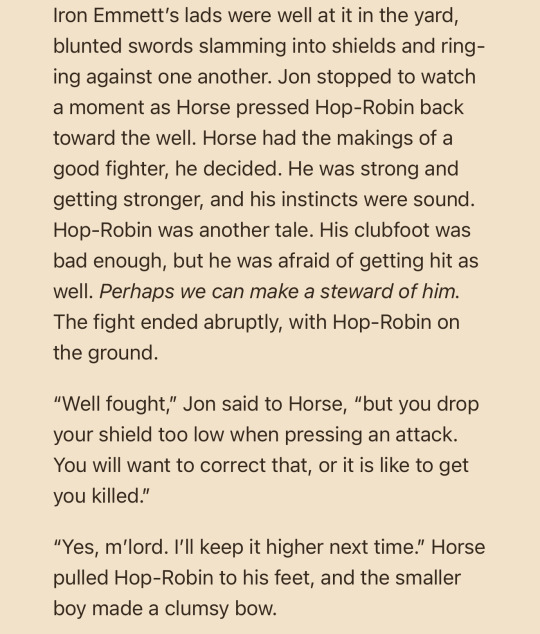
He takes notice of Hop-Robin’s disability, and does not find him unuseful because of his disability, but because he’s a wiener who isn’t very good at fighting. He knows some men just aren’t great at combat, but doesn’t discourage them from still learning how and training to get better, as he reminds Sam literally a paragraph later. He thinks to himself that Hop-Robin will make a good steward.
When one of Stannis’s knights addresses Jon as “boy” in an attempt to poke at a bruise, Jon ignores him until he addressed appropriately. Jon doesn’t clear his throat, doesn’t demand a correction, because he knows the knight knows better. He’s a sworn knight, after all. He waits until he is called upon by his correct address.

He commands his men. He manages his men. He knows his men. He cares for his men. Just as Ned did. Just as his father did. And demands respect from men that are not his to guide in a way that reminds them that he has nothing to prove to them. He has nothing to prove, in general.
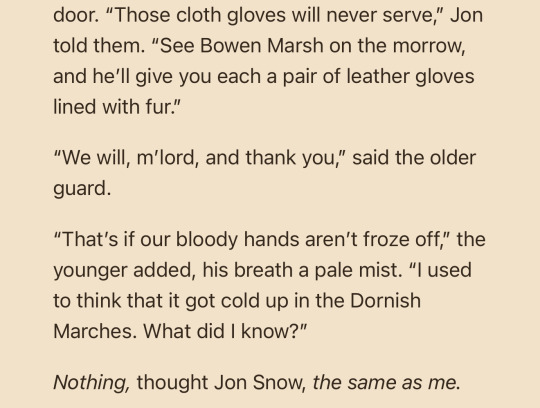
Because in the time he’s spent north, at the wall and otherwise, disconnected from his family—no matter his fractured relationship or perceived view of them—he’s grown from the eyeliner-wearing, brooding, thinking-breaking-Benjamin-goes-hard, I-have-to-martyr-myself-from-pussy-for-respect, duty only no bitches ass teenage boy to a man who mirrors his own father— I mean, Ned may not be the Daddy, but that man. Is.
THE FATHER.

#Jon snow#asoiaf#adwd#a dance with dragons#Ned stark#eddard stark#house stark#a song of ice and fire#asoiaf meta#adwd meta
108 notes
·
View notes
Text
on lyanna as her own knight
lyanna’s narrative role seems to be an interesting reimagining of the classic ‘damsel in distress’ and ‘princess trapped in the tower’ tropes. these are fantasy staples, but ones considered fairly problematic by modern audiences for obvious reasons. george’s use of these tropes isn’t straightforward—he’s reconstructing them through a myriad of perspectives with lyanna at the center.
we were introduced to lyanna through two very different lenses: daenerys targaryen’s and robert baratheon’s. both had their own versions of the rebellion, but each reflected the same glaring flaw: lyanna was reduced to either a victim (in robert’s version) or a love interest (in dany’s). her own perspective was never truly considered by either of them.
robert’s version was slowly deconstructed: ‘you never knew lyanna as i did, robert … you saw her beauty, but not the iron underneath.’ this line painted robert’s version of events as extremely unreliable, and hammered home the earlier hints that robert was not to be trusted on this subject. and through lyanna’s mini-me—arya stark—and ned’s own reflections, we get a more vivid picture: lyanna was intelligent, willful, and opinionated, and most importantly, someone who was not happy with the role others had chosen for her. she did not want to be robert’s bride.
dany started from a different angle, but her understanding of rhaegar (and by extension, lyanna) was previously limited. though now her view of rhaegar is slowly being reconstructed as she learns more about him, and with it comes a growing awareness of her idolized brothers faults. her questions—especially the ones about elia—signal the slow reconstruction of rhaegar as a much more human hero, flawed but still good.
so while both robert and dany started off with and introduced readers to faulty tales, each of their versions have already been challenged. the key difference? dany wants to know the truth. robert was not interested in seeing his fantasy corrected—he needed it to be true.
but even after those versions evolved, the missing piece is still lyanna herself. she was reduced to a symbol in both narratives—robert’s lost love, rhaegar’s northern girl. ned’s pov challenged robert’s version and offered glimpses of who lyanna really was, but ned died before the full truth could be told. (if only he had made it to the wall to speak with jon…)
and since dany’s focus is on her brother rhaegar (understandably so), it’s left to other povs to bring lyanna’s side into focus. enter bran, and the tale of the knight of the laughing tree—the point where the deconstruction of the damsel in distress and princess in the tower tropes truly began in earnest.
i fully believe in the lyanna = the knight of the laughing tree theory, especially since it is consistent with the version of lyanna ned introduced to us. this theory helps to reframe lyanna as her own knight, and possibly her own savior. it also explains why the text keeps reminding us that lyanna was a skilled horsewoman. on that note, does anyone honestly believe lyanna would get caught by rhaegar and his kingsguard while she was on horseback… if so then pls bsffr lol.
in meera’s tale, the knight of the laughing tree is the story’s hero. bran—lover of underdogs—enjoyed the tale and asked: ‘did the knight of the laughing tree win the tourney and marry a princess?’ he was told no. that led to bran having some mild critiques of the story—a little boys disappointment at the injustice of it all—and meera’s response to that hinted at the sad ending of the next installment of the tale of the knight of the laughing tree :(
but this image of lyanna as her own knight, of the hint that rhaegar was her prince(ss)… well, besides inverting gendered fairytale dynamics, this becomes central to george’s clear and deliberate reworking of traditional fantasy tropes. the classic tale is: a dragon kidnaps a maiden, locks her in a tower, and a knight comes to slay the dragon and save her. but here? lyanna was the knight. she found her own way out of an unwanted marriage and may have even found love along the way—doomed as it was.
and personally? i’m simply not interested in interpreting this as a subversion of a subversion—because then we’re right back where we started: lyanna as a damsel who needed to be saved by men from the evil dragon. and that’s boring. when we consider key moments—like rhaegar’s final word being lyanna’s name, or the symbolic weight of the winter rose—it all points to the same conclusion: rhaelya was a tragic romance.
and continuing with the subversion—it’s much more interesting to imagine the tower not as a prison, but as a place of joy. a fleeting joy, eventually destroyed. ned tearing the tower down becomes deeply poetic. but that joy? it lives on in jon—rhaelya’s bastard son. honestly, it’s almost too on the nose that another highborn bastard is named ‘joy.’
so to me, this is the story of a girl who became her own knight, chose her own fate, and paid the price for a freedom the world refused to give her.
#asoiaf#valyrianscrolls#asoiaf meta#lyanna stark#daenerys targaryen#rhaegar targaryen#robert baratheon#eddard stark#rhaelya#jon snow#hello i’m back to once again beat this dead horse
106 notes
·
View notes
Text
The thing about pitting Rhaenys (show) and Catelyn (show & book) against each other, in their reactions to their husband’s bastards, is that it completely ignores the context of their situations.
Many men fathered bastards. Catelyn had grown up with that knowledge. It came as no surprise to her, in the first year of her marriage, to learn that Ned had fathered a child on some girl chance met on campaign. He had a man’s needs, after all, and they had spent that year apart, Ned off at war in the south while she remained safe in her father’s castle at Riverrun. Her thoughts were more of Robb, the infant at her breast, than of the husband she scarcely knew. He was welcome to whatever solace he might find between battles. And if his seed quickened, she expected he would see to the child’s needs.
He did more than that. The Starks were not like other men. Ned brought his bastard home with him, and called him “son” for all the north to see. When the wars were over at last, and Catelyn rode to Winterfell, Jon and his wet nurse had already taken up residence.
That cut deep. Ned would not speak of the mother, not so much as a word, but a castle has no secrets, and Catelyn heard her maids repeating tales they heard from the lips of her husband’s soldiers.
— A Game of Thrones, Catelyn II
Catelyn understands the social rules of the society she lives. She’s been taught the belief that men having affairs and fathering bastards is normal. But even in such a patriarchal society, there has to be a level of respect afforded to the wives of the men that cheat (especially if they’re noblewomen from powerful families). In Catelyn’s case, she feels slighted because her husband raised his bastard in the same household. It is considered a social insult to Catelyn that her husband did this to her.
She had come to love her husband with all her heart, but she had never found it in her to love Jon. She might have overlooked a dozen bastards for Ned’s sake, so long as they were out of sight. Jon was never out of sight, and as he grew, he looked more like Ned than any of the trueborn sons she bore him. Somehow that made it worse.
— A Game of Thrones, Catelyn II
Obviously it’s not fair to Jon that Catelyn takes out her resentment on him. Though from her POV chapters, it’s shown that she holds no negativity towards Ned’s mystery mistress despite hating Jon. It’s impossible to hate someone you don’t even know. Meanwhile, Jon is a living, breathing reminder of her husband’s infidelity. While it would be a more reasonable reaction for her to dislike Ned rather than misdirect her negative feelings towards Jon, Ned is still her lord husband. It is easier for Catelyn to hate Jon.
When it comes to Rhaenys, her husband’s mistress and bastards are relatively unknown to her, even if she is aware of their existence. They were kept far away from her. So Rhaenys is less likely to resent them. That’s why Rhaenys addresses only Corlys with barely concealed anger but Alyn doesn’t earn her scorn. The scene between her and Alyn in episode 4 appears to be the first time those two have ever interacted. Rhaenys has not had to live every day with the reminder of her husband’s betrayal. If it’s out of sight, it can be (relatively) out of her mind.
I’m sure that the way this show characterizes its female characters as more gentler/calm individuals definitely plays a part with how Rhaenys reacts here too. Which is why the viewers are led to assume Rhaenys just quietly accepted the fact of her husband cheating on her.
In the book, Corlys never dared have his bastards around whilst his wife still lived. He kept the affair so discreet that had it not been for him personally presenting the boys at the Red Sowing, no one would have assumed him to be the father. Both Addam & Alyn were staying with their mother and serving in her fleet. In the show, Alyn is in Corlys’ fleet, and therefore more likely to come under notice (and that’s exactly what happens).
Princess Rhaenys, his wife, had the fiery temperament of many Targaryens, Mushroom says, and would not have taken kindly to her lord husband fathering bastards on a girl half her age, and a shipwright’s daughter besides. Therefore his lordship had prudently ended his “shipyard trysts” with Mouse after Alyn’s birth, commanding her to keep her boys far from court. Only after the death of Princess Rhaenys did Lord Corlys at last feel able to bring his bastards safely forward.
— Fire & Blood, The Dying of the Dragons
Not only did Corlys have an affair with a young girl (coincidentally the same age Rhaenys was when she married him), but said girl is also a commoner. Rhaenys is a princess who could have been a queen. For Corlys to make his affair public would have been a huge insult to his wife, even if he never brought up the matter of his bastards. Rhaenys would have been rightfully furious at the shame her husband’s actions bring upon her. She was the first to speak up when her position as heir was usurped so that suggests she’s not the type to just turn a blind eye to anything she considers an injustice against her. Book version has a far more fiery personality than her show counterpart. Her reaction to the truth would probably be different too.
A detail in episode 4 which I did like is when Rhaenys corrected Alyn about her title. Princess not Lady. She’s asserting her position and status in that moment. Alyn serves the Lord of Driftmark so naturally his Lord’s wife would be a Lady to him. By correcting Alyn, Rhaenys places him in the position of an ignorant who does not even know the difference between the titles. Perhaps a subtle expression of classism towards another who is very much beneath her. But the glimmer of antagonism is gone as soon as it appears. Their interaction is not simply Rhaenys welcoming her husband’s bastard with open arms.
The show leaves Rhaenys’ original reaction, when she first finds out about the affair, to the imagination. So it’s difficult to say what exactly she felt in the moment. Unlike fiery tempered book!Rhaenys, the show version is more calm and collected. She is a person who seeks peaceful resolutions to problems (similar to Catelyn) so her reaction in the show makes sense for her even if it’s different from how the book version of her may have reacted. In the HOTD canon, we’re basically getting an interpretation of how Catelyn might’ve reacted to Jon had he been raised away from Winterfell.
#asoiaf#house of the dragon#rhaenys targaryen#catelyn stark#corlys velaryon#eddard stark#alyn velaryon#jon snow#meta#is this me defending hotd? mayhaps#(no. not really.)#I don’t like that the show changed rhaenys’ personality#but in the context of show canon alone her reaction to her husband’s bastard makes perfect sense#also defending catelyn I guess#who would’ve thought the day would come#I need to stay away from hotd twitter#looking at the discourse there on this topic has given me so much emotional damage 😵💫😵💫
267 notes
·
View notes
Text
“ned, jon and lyanna’s body all showed up together, why don’t people know?” because that would never happen. there is no possible way that lyanna’s body wouldn’t have decomposed which means she would have to be given to the silent sisters somewhere in Dorne. It’s possible ned could have been given her bones then and there but we know he sent them directly to winterfell. Ned didn’t go straight to winterfell, he went from the tower of joy to starfall then to King’s Landing to make amends with Robert after the blow up about elia and her children. for most certain he did not bring rhaegar’s newborn son to the place where his siblings were just brutally murdered. so what happened to jon? my best guess is that wylla the wetnurse, or whoever was seeing to him, took a boat from starfall (bc grrm made a point of saying they have them) to the north. so ned, jon, and lyanna all show up at varying times probably months to weeks in between and then ned sends for catelyn and robb. it’s not something that really looks suspicious imo
#this is one of my major pet peeves#i think people forget that ned went to KL and that’s where people get confused#asoiaf timeline#jon snow#ned stark#lyanna stark#r+l=j#valyrianscrolls#valyrian scrolls#house stark#game of thrones#asoiaf#asoiaf meta#tower of joy#eddard stark#wylla the wetnurse
395 notes
·
View notes
Note
do you have any theories as to why Ned didn't return Willam Dustin's body to the North? Even accounting for the fact that he probably couldn't have reasonably suspected that this would lead his widow into nursing a decades long grudge against House Stark, it seems out of character for him to just leave the corpse of a cherished northern companion in Dorne
It’s important to remember the context of Willam Dustin’s death - that is, the events of the tower of joy. Net had not just experienced Willam’s own death (not to mention the deaths of his other northern companions, still less the deaths of the Kingsguard members). He had also witnessed the death of his beloved sister, while simultaneously discovering the existence of (as yet unnamed) baby Jon. Ned was dealing with a situation both personally traumatic and practically highly complicated and delicate - one in which Willam Dustin’s death, and the question of his body’s fate thereafter, was only a single part.
In this situation, I think Ned had to make hard decisions about how he was going to proceed. He had to dispose of the bodies of both his comrades at arms and the fallen Kingsguard in a way that wouldn’t arouse suspicion about the circumstances of their deaths; he had to provide for the baby nephew whose mother may have made his welfare her dying wish to her brother, and whose very existence was a potential bombshell for the rebellion he, Ned, had just helped lead to victory; he had to return his much-loved sister to her final resting place among the Starks, as she had also requested; and he had to go back to Winterfell, along the way breaking the news - or a version of the news - of the tower of joy to those families affected - not just Lady Barbrey, but also Ashara Dayne (not to mention the Glover, Cassel, Ryswell, and Wull families presumably as well).
So I think Ned decided that the best course of action with respect to Willam Dustin’s body was to bury it at the site of the now-demolished tower of joy, along with the bodies of the rest of the fallen men. As a matter of practicality, it would be much easier burying Willam and the others there than try to drag the bodies of eight men however far it would be from the relative remoteness of the tower of joy to the nearest silent sister to strip the bodies to bones (a rather specialized skill, as Barristan ruefully reflects when considering what to do with Quentyn Martell’s body in Meeteen). It was not, I think, that Ned did not care about Willam Dustin: indeed, the fact that Ned selected Willam as part of the very small party Ned compiled to accompany him on his mission to find Lyanna speaks I believe to Ned’s trust in Lord Willam’s skill and discretion. Nor do I think Ned was trying to insult Willam’s memory, the Dustins, or Lady Barbrey in this moment; after all, I don’t think Ned was trying to insult the memory of Ethan Glover; his own beloved late brother’s squire, or that of Martyn Cassel, a familiar face of Winterfell Ned had likely known from early childhood and his trips home from the Eyrie (not to mention Arthur Dayne; a knight Ned seems to have deeply respected). However, in an extremely sensitive situation, where the greatest level of secrecy had to be maintained, trying to get the five dead northerners, not to mention the three dead Kingsguard, to a silent sister or a motherhouse of silent sisters to have their bones preserved might have seemed like an excellent opportunity to raise questions about what the Lord of Winterfell and the Lord of Greywater Watch were doing with so many notable dead warriors (including Kingsguard missing from every major latter stage battle of Robert’s Rebellion), beyond the considerable practical impediments to doing so. If Ned cared most deeply about his late sister, and his promises to her, above anyone else who perished at the tower of joy - and I’m sure he did - it was also practically much easier for Ned to take the single body of Lyanna to be stripped to its bones without as much in the way of questioning, and leave his dead companions and the dead Kingsguard as fallen in battle not otherwise specified.
Of course, because Ned had to maintain strict secrecy around what truly happened at the tower of joy, there was no way to explain all of this detail to Barbrey. If Ned was willing to intimidate into silence even his own wife on a line of questioning dangerously close to the events around the tower of joy showdown, he was certainly not going to tell Barbrey the full circumstances of Willam’s death and burial. Barbrey’s feelings of grief for the man I think she loved were undoubtedly real and valid, and by extension her bitterness toward Ned for seemingly prioritizing his sister over her late husband, but Barbrey also could not know why Ned had done what he did, nor what personal cost Ned believed he bore in being unable to return the bones of any of the men who had perished in the shadow of that tower.
98 notes
·
View notes
Text
That Ned’s ghost and bones are in a constant state of restlessness after his death is so interesting to me. We haven’t heard much of Ned’s bones after Lady Catelyn sent Hallis Mollen north with them, but then Barbrey Dustin in ADWD says that she intends to block them from reaching Winterfell, and the reason for doing so is tied around her husband dying at the Tower of Joy and not returning home.
But what is more revealing is immediately after his death, Ned’s ghost gets to the crypts and wanders about restlessly, which is felt by the three Stark boys who have the power of prophetic dreams: Jon who constantly looks for his father in this “underworld” is pulled into searching for Ned before his execution, Rickon is called to the crypts and has a mysterious conversation with Ned where he promises to come back (but how will he be back if he’s dead?), and then there’s Bran who gets to have a more substantial conversation with his dead father’s ghost as he speaks sadly about Jon.
We know that even before death, Ned was surrounded by a sense of guilt and shame because of Jon, and he even expressed a deep desire to speak with the boy. Accounting for all these, it starts to look like Ned’s restlessness, dead or alive, is deeply rooted in the secret of Jon’s parentage and can only be alleviated once he confronts Jon about this truth. That might explain why Jon is constantly looking for Ned in the crypts and why he’s afraid of what he might find down there (and not who). So perhaps Ned’s bones can only be laid to rest once his ghost sets things right with Jon.
#asoiaf#r plus l equals j#eddard stark#jon snow#i have like a lot of thoughts regarding rlj jon ned and the crypts#thematically it makes the most sense for ned to reveal jon’s parentage there and im working on a meta explaining my reasoning#but I just had to take a lil detour and talk about his ghost and bones not knowing peace because of jon#valyrianscrolls
226 notes
·
View notes
Note
why did Jamie want Neds approval so much? More so than anyones apart from rhaegar
I think it ultimately boils down to three key things:
Ned's reputation for honor
Ned was THE first person to judge Jaime for killing the king
Jaime still has the emotional maturity of a teenager
Thanks for the question, anon
26 notes
·
View notes
Text
I don't think we talk enough about the complexity of Eddard Stark.
Ned is the second son of the powerful house of the North. He wasn't supposed to rule, but to fight. He was raised to lead battles, to second his brother, Brandon. Then, his sister Lyanna got kidnapped, Brandon went to the capital to ask for the return of his sister, Rickard went also to the South to help his eldest and they both died there, killed by the king himself. Then Aerys asked for his head and Jon Arryn refused and declared war.
(Kinda ironic that the rebellion is called Robert's rebellion when in truth, it was Jon Arryn who made the first act of rebellion by refusing his king and calling the banners. I know in the end, it got that name because Robert became king and I've always found it interesting.)
Imagine how Ned felt when he learnt that the king Aerys was ready to erase House Stark, by ordering the head of one of the last heirs. Lyanna was lost in the south, with the prince. Probably Aerys would have asked for Benjen's head too...
But Ned did his duty, he called the banners and married Catelyn to unite the North and Riverrun. Then he fought alongside Robert and went to Kingslanding, discovering the sack of the capital and then his first disappointment with Robert... Robert wasn't horrified at the sack and the killing of Elia's child. Duty and honor are important to Ned (interesting that Ned fits so well the words of Tully's house). After other disagreements, he left to find Lyanna... and his sister was dying when he found her.
There is lots of trauma in Ned because of that war. He lost almost all of his family. When he returned to Catelyn, he came back with Jon (a child he decided to take with him because of love) and found his heir, Robb. Catelyn and him didn't have a great relationship then (Catelyn quite liked Brandon), and the presence of Jon made it worse. A few words after his return, Benjen left for the Night's watch.
Ned only started to rule Winterfell and already had lof of grief and trauma.
I'm not going to describe the rest of his background, it's quite developed and detailed. But I think GRR Martin did a great job with Ned. You can see his trauma, his doubts and his inferiority complex. He's torn apart between his family, his love for Robert, his duty and most importantly his honor. Everything is quickly translated in the way he talks about his brother :
Brandon. Yes. Brandon would know what to do. He always did. It was all meant from Brandon. You, Winterfell, everything. He was born to be a King's Hand and a father to queens. I never asked for this cup to pass to me.
Even after years of leading Winterfell, he still doesn't feel he's right for the role. Or at least, he thinks his brother would have made a better job. He's probably bitter too and has the survivor's guilt. In my humble opinion, for all we know, I'm not sure I agree with this "statement". Brandon was impulsive, hot-tempered and quite arrogant. He's said, by Catelyn, to be charismatic. But he doesn't sound like someone who would be good at ruling, at fighting definitely, but ruling ?
And when Cersei told him he should have taken the throne, instead of Robert, he answered that :
I have made more mistakes than you can possibly imagine, but that was not one of them.
It's true he made mistakes (he's human after all), but are they worse than Robert's mistakes ? Ned doesn't have this belief he's fit to rule neither the North or the seven kingdoms. He ruled the North and accepted to be the Hand's king not because he likes it, but because of his duty and honor. And even when he's in conflict with Cersei, he stills cares about it. He offers Cersei to leave with her children - because he refuses to harm a child - tells Stannis of him being the natural heir to Robert and refuses Renly's aid to take the Lannister's children as hostage. The only time he firmly goes against Robert is when he's plotting to kill Daenerys, a child.
(Note that Robert also thinks Ned should have ruled the kingdom instead of him. At least, he's aware of his flaws.)
He doesn't want to see the horrors of the past repeating themselves. Horrors he had witnessed. And he has a lot on his shoulders : ruling the kingdom (because Robert doesn't care about it and doesn't have the decency to do his duty), searching for informations about Jon Arryn, raising his daughters etc. You can see his trauma in the way he never planned for betrothals for his children (Robb was 14 at the beginning of the story). None of his children were fostered. Seems like he wants to keep his family around him as much he can. You also see it in the way he named his children (Jon for Jon Arryn, Bran for his brother and Rickon for his father). But when Robert, the only person he loves as much as his family, comes to him, he can't refuse. Even when his family was grieving, his wife crying for Bran, he still took his daughters with him and left with Robert. Plus he feels "obligated" to search the truth about Jon's death. Or the way he loves both of his daughters, but can talk to Arya and can't talk to Sansa only because of his trauma concerning Lyanna.
I'd like to add many people noticed Ned's honor, from Robert, Baelish, Stannis to Jorah. My favourite is probably this one from Robert
You never could lie for love nor honor, Ned Stark.
When Ned told Robert didn't know Lyanna, he's right. But it seems Robert didn't know Ned that much either. Because Ned lied twice for love, to protect Jon from Robert's wrath (if we consider Jon is indeed Rhaegar's son) and to protect Sansa from the Lannister. His honor was more important than his life, but less important than his daughter's life. He isn't afraid of death, but cares more about his family. Yeah I think Family, duty & honor fits him quite well, maybe even better than the words of his own house...
#asoiaf#asoiaf meta#i guess#ned stark#eddard stark#house stark#family duty honor#asoiaf thoughts#a song of ice and fire
28 notes
·
View notes
Text
"he was never unfaithful to robert, was he?" - jaime, acok
ha. ha ha ha. the irony of this line is incredible. what's so striking to me is how one dimensional the realm's understanding of eddard stark as an honourable man is - honour itself is an incredibly complicated and unattainable ideal in asoiaf and i think ned as the stereotypical emblem of it encompasses many of the reasons why. because whilst he absolutely does consider acting in a conventionally honourable way important, he always prioritises those he loves. he defended cat's actions as his own without a second thought when she arrested tyrion. his main priority in king's landing is to see his daughters safe, not to secure the succession. lyanna is the prime example: jon's existence is not the result of the lapse of honourable ned stark, it was honourable ned stark choosing his love for his sister over his duty to his king. that and his personal ethical belief that the political murder of a child is never morally acceptable.
no one in the realm has the insight into his personality we get in the first book. none of his children, vitally, understand that he would always prioritise their safety over any honourable scruples. all of the starklings question what their honourable father would think of their actions - killing in self-defence, marrying jeyne westerling, sleeping with ygritte to name a few examples - without recognising that ned's true first priority was always his family's safety.
in fact, he betrayed robert far more than he ever betrayed cat and he would have betrayed honour for his family's safety every time.
#eddard stark#ned stark#i count dany and ned's resistance to her assassination as a betrayal as well btw#because not only was this a moment in which her killing could be contrived as honourable and ned said no thanks acc#but he was absolutely projecting his love for jon onto her#he could not stand by if it was his innocent son/nephew#asoiaf#a song of ice and feels#jon snow#arya stark#house stark#asoiaf meta#catelyn stark#robb stark#catelyn tully#jaime lannister#acok#robert baratheon#i could write a whole post on honour in got alone#and one day i probably will#jon is particularly afflicted with oh god what would my dad say#bestie if you have to sleep with ygritte and play turncloak to survive HE WOULD WANT YOU TO SURVIVE#he didn't make that promise to fold over some thousand year old irrelevant vow
3K notes
·
View notes
Text
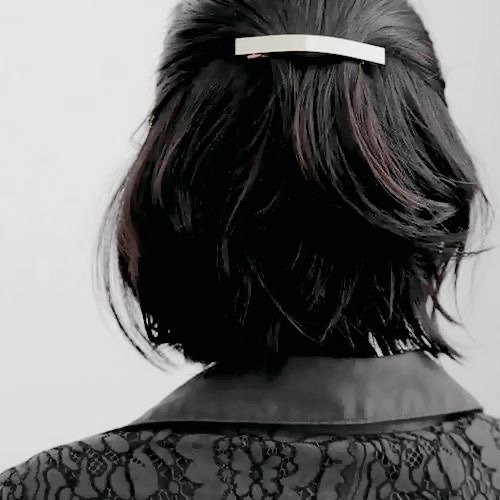
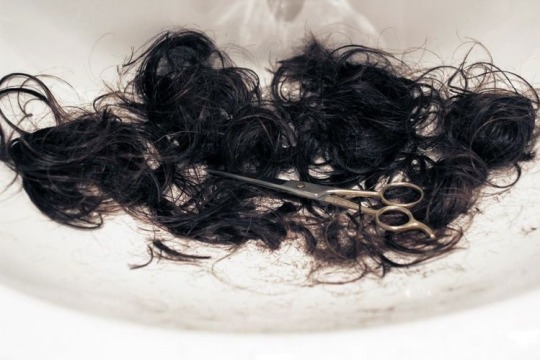

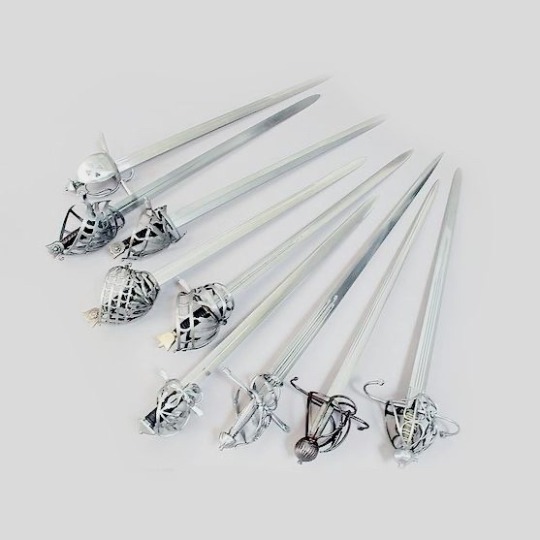




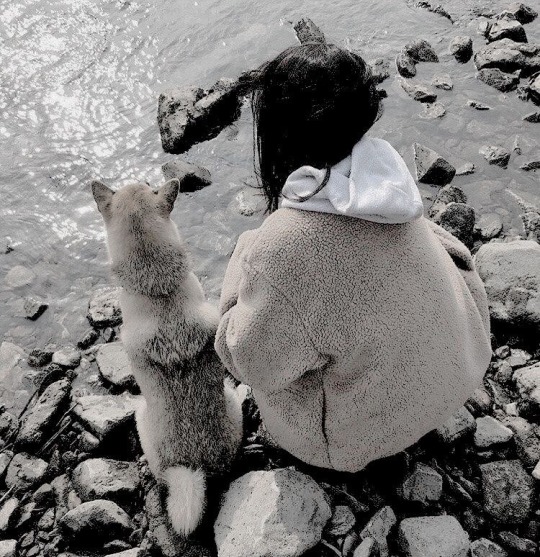
Modern Arya 🔪
masterlist
game of thrones masterlist

#arya stark#nymeria#sansa#daenerys targaryen#direwolves#arya x jaqen#daenerys targeryan#arya x gendry#arya samaj marriage#arya drottningu#arya stark x reader#arya stark fanart#a song of ice and fire#asoiaf art#jon snow#robb stark#house stark#sansa stans#sansa stark#sansa x sandor#sansa x jon#sansa x tyrion#sansa x margaery#eddard stark#game of thrones quotes#asoiaf meta#asoiaf#got#game of thrones imagine#game of thrones x reader
85 notes
·
View notes
Text
A Game of Thrones - Eddard I
And so the king's court comes to Winterfell.
Ned knew many of the riders. There came Ser Jaime Lannister with hair as bright as beaten gold, and there Sandor Clegane with his terrible burned face. The tall boy beside him could only be the crown prince, and that stunted little man behind them was surely the Imp, Tyrion Lannister.
It's kind of funny re-reading this passage, but it makes sense that most Starks and Lannisters hardly know each other at all at this point. It's the first time visiting the North for many of these people. You really feel the sense of how distant Winterfell is from everywhere else - no one ever goes there from the South, and the Starks hardly leave it either. Ned and Robert haven't seen each other since Balon's rebellion.
Something's off about the timeline. In Cat's first chapter, Ned says, "It will be good to see the children. The youngest was still sucking at the Lannister woman’s teat the last time I saw him," and Cat states Tommen is seven years old. Now Ned muses that it's been nine years since he last saw Robert, at Balon's rebellion. Why would Ned see Cersei and baby Tommen without Robert? Considering the queen and the kids have been traveling on a giant wheelhouse that doesn't even fit the castle gate, trained by forty horses - I doubt Cersei is the kind of person who would travel much with an infant. Unless she'd be going to Casterly Rock to have baby Tommen meet his grandfather, but why would Ned go there?
I mean, it's doesn't matter. We're just in the exposition stage. The funniest in-story explanation is that Ned and Cat were just mixing up babies in their memories and it wasn't baby Tommen they saw but baby Myrcella, in that case the timeline would work since Myrcella would be of breastfeeding age nine years ago. I'll just accept that.
Anyway. Ned is taken aback by how much Robert has changed, no longer built like a warrior, but a fat man that smells of perfume instead of blood.
So many of Ned's memories are tied to the smell of blood. He remembers Robert as smelling of leather and blood, he remembers the room Lyanna died in as smelling of roses and blood. He's a man whose past is filled with the scent of blood, that he can still smell with his memory. It's easy to point the finger at Ned's mistakes, but this is a man traumatized to the seven hells and back who uses defensive mechanisms (like the rose-tinted glasses he looks at Robert through) that progressively crumble leaving him undefended.
(It's also interesting how wolves are often described as smelling blood, and the Starks who warg into wolves, Bran and Arya, often mention the smell of blood in their noses. Something about a circle of violence, blood spilled that calls for more blood and whose scent fills the nostrils of the younger generation.)
Speaking of Lyanna.
No sooner had those formalities of greeting been completed than the king had said to his host, “Take me down to your crypt, Eddard. I would pay my respects.” Ned loved him for that, for remembering her still after all these years. He called for a lantern. No other words were needed. The queen had begun to protest. They had been riding since dawn, everyone was tired and cold, surely they should refresh themselves first. The dead would wait. She had said no more than that; Robert had looked at her, and her twin brother Jaime had taken her quietly by the arm, and she had said no more.
The dead wolf girl will always matter more to Robert than his living wife, and it seems Cersei still minds that even after all these years. Jaime diffuses a potential nasty situation, which is a microcosm for Jaime's role in Robert and Cersei's marriage - keeping Cersei placated enough that the friction between her and Robert is reduced to a minimum. And yet it's not enough. (And pretty ironic, since Jaime's role in that marriage is both solving problems and creating bigger ones.)
"This king Ned scarcely recognized" Ned thinks of Robert, and that's the point, isn't it? Robert has changed physically, but he's still the same man he's always been. It's Ned that remembers him different - a better man than Robert has ever been - and will struggle with the realization.
“I was starting to think we would never reach Winterfell,” Robert complained as they descended. “In the south, the way they talk about my Seven Kingdoms, a man forgets that your part is as big as the other six combined.” “I trust you enjoyed the journey, Your Grace?” Robert snorted. “Bogs and forests and fields, and scarcely a decent inn north of the Neck. I’ve never seen such a vast emptiness. Where are all your people?” “Likely they were too shy to come out,” Ned jested. He could feel the chill coming up the stairs, a cold breath from deep within the earth. “Kings are a rare sight in the north.” Robert snorted. “More likely they were hiding under the snow. Snow, Ned!” The king put one hand on the wall to steady himself as they descended. “Late summer snows are common enough,” Ned said. “I hope they did not trouble you. They are usually mild.” “The Others take your mild snows,” Robert swore. “What will this place be like in winter? I shudder to think.” “The winters are hard,” Ned admitted. “But the Starks will endure. We always have.”
A very effective picture of the North in just a few lines! Although there's more to the North than the hard parts.
Robert's description of the South in summer is pretty poetic, I mean, if you ignore the misogyny in his description of women. Okay, it partly speaks of Robert's privilege as he can enjoy all the pleasures his land can offer. But I also think he's not that far from the truth when he says that everyone is "fat and drunk and rich". Obviously that's not true true, since peasants are still peasants and not rich, but the kingdom is enjoying a long period of peace and prosperity. They've been having a long summer. The only war since the Rebellion was fought in the Iron Islands, leaving the rest of the kingdom untouched. So Robert is, like, getting the right answer while using the wrong formula. Most people are not as weathy as he is, but there's good crops, food in abundance for everyone, and the economy of the kingdom is flourishing. Which makes it ever more heartbreaking when war breaks out and everything goes to hell. Winter is coming for the kingdom in horrific ways they don't realize yet.
It was always cold down here. Their footsteps rang off the stones and echoed in the vault overhead as they walked among the dead of House Stark. The Lords of Winterfell watched them pass. Their likenesses were carved into the stones that sealed the tombs. In long rows they sat, blind eyes staring out into eternal darkness, while great stone direwolves curled round their feet. The shifting shadows made the stone figures seem to stir as the living passed by. By ancient custom an iron longsword had been laid across the lap of each who had been Lord of Winterfell, to keep the vengeful spirits in their crypts. The oldest had long ago rusted away to nothing, leaving only a few red stains where the metal had rested on stone. Ned wondered if that meant those ghosts were free to roam the castle now. He hoped not. The first Lords of Winterfell had been men hard as the land they ruled. In the centuries before the Dragonlords came over the sea, they had sworn allegiance to no man, styling themselves the Kings in the North.
Actually, Ned, I think it's going to be a good thing that the ancient Kings of Winter are around. Just in case something passes by that the ancient Kings of Winter would be used to deal with. Just saying. I do wonder what will be the role of the dead in the crypts of Winterfell, but of one thing I'm sure: they won't be used as puppets by the Others. The ancient people of the North knew better than to leave their dead undefended. Like the Wall is inbued with defensive magic, I'm sure these tombs have a heavy dose of magic against the enemy. Maybe those swords were never supposed to protect the living from the dead in the crypts, but were supposed to be wielded by the "good" dead to protect the living from the "bad" dead, and in time that knowledge was lost.
Anyway, they are so very going to play a part, these ancient Starks whose eyes follow Ned and Robert as they pass. It's always meaningful when something that should not be sentient feels like it's watching. It usually means there is, in fact, something sentient watching. Maybe this is also [going to be] Bran, maybe not.
The crypt continued on into darkness ahead of them, but beyond this point the tombs were empty and unsealed; black holes waiting for their dead, waiting for him and his children. Ned did not like to think on that.
Something that seems creepy while they're alive - the tombs meant for them - turns out to be something desirable once they're dead. Ned's bones being prevented from reaching their supposed resting place, Robb's body defiled and desacrated, Cat's body (she might not be a Stark, but she becomes one during the war) being given a sacrilegious mockery of a Tully funeral - none of them can rest, they all haunt the kingdom and the narrative, in Cat's case she literally comes back to life as a revived corpse, but Ned and Robb also haunt the South. And of course, the absence of them in their place in Winterfell also creates a spiritual imbalance in Winterfell itself.
(Also, honestly, I find there's something sweet and comforting in the empty space in the marble of the family grave where my picture and name and the pictures and names of my loved ones will eventually be placed. It's inevitable that each of us will die, after all, and it's nice to know we'll be in the same place to rest together.)
The dead of House Stark will need to be put to rest before the end of the story. The fact that Ned's first chapter is set in the crypts... I see what you did there, George. Ned's journey will find its conclusion here.
There were three tombs, side by side. Lord Rickard Stark, Ned’s father, had a long, stern face. The stonemason had known him well. He sat with quiet dignity, stone fingers holding tight to the sword across his lap, but in life all swords had failed him. In two smaller sepulchres on either side were his children. Brandon had been twenty when he died, strangled by order of the Mad King Aerys Targaryen only a few short days before he was to wed Catelyn Tully of Riverrun. His father had been forced to watch him die. He was the true heir, the eldest, born to rule. Lyanna had only been sixteen, a child-woman of surpassing loveliness. Ned had loved her with all his heart. Robert had loved her even more. She was to have been his bride.
Both Ned and Robert had their lives uprooted by the deaths of the two Stark siblings. Ned took Brandon's place as Lord of Winterfell and as Catelyn's husband. Robert, well. Ironically he takes the place that was supposed to be Rhaegar's and marries the woman Rhaegar was supposed to marry originally. But Ned embraces his unexpected role and quickly grows to love his wife, Robert just despises the responsibilities of the throne and Cersei.
The fact that Ned was not supposed to rule Winterfell... It makes you wonder if this is ultimately the reason Ned is so unequipped to deal with the court and eventually loses the game of thrones. He was not raised to be Lord of Winterfell, he was raised to run some holdfast for his older brother (like he tells Bran he'll do for Robb - I see what you did there, George). Catelyn, on the other hand, was raised almost like a firstborn son for years since her father was afraid he'd never get a son. And it's Catelyn that almost makes it - she insist they hurry to eat under the Frey's roof, so that the rules of hospitality will keep them safe. She plays the game well... it's just that the other side breaks the rules of the game. You can't blame her for that.
Anyway, let's not get too ahead of ourselves. If "by ancient custom an iron longsword had been laid across the lap of each who had been Lord of Winterfell, to keep the vengeful spirits in their crypts" then it means that Brandon and Lyanna don't have one. Maybe Brandon was given one anyway, since he was meant to be Lord of Winterfell. But Lyanna surely hasn't been given a sword. I don't know if that means anything metaphysically, but metaphorically her ghost is haunting the two men visiting her grave for sure.
I love how Robert dislikes her resting place arrangement, unable to understand what it means to a Stark. Robert never understood anything about Lyanna, and I am convinced that it was her choice to go with Rhaegar instead of marrying Robert, that she purposely did it to avoid marrying Robert.
Speaking of Rhaegar... in the previous chapter, Dany thinks of Rhaegar's death as something Rhaegar did "for the woman he loved". Now Robert and Ned obviously think of Rhaegar's death as punishment for harming Lyanna... The truth is probably in the middle, alright. Rhaegar was not the perfect man Viserys has described him to Dany, but he was not the man Robert thinks of him.
Rhaegar is still a mystery we're given clues to here and there in the books. Personally I think his tragedy was the weight of prophecy on him - at some point he must have realized that the "ice and fire" part of "the song of ice and fire" did not refer to "our side (fire) and the enemy (ice)" but "Stark and Targaryen" (as in the "Pact of Ice and Fire" established during the Dance of the Dragons), which must have made him think of his marriage to ~more fire~ (a Martell i.e. the sun) the wrong choice, because the prince who was promised could not be fire+fire but fire+ice. And then he possibly met a Stark girl who was very determined to create her own path instead of marrying the man her father had promised her to... and the rest is history.
“In my dreams, I kill him every night,” Robert admitted. “A thousand deaths will still be less than he deserves.” There was nothing Ned could say to that.
Ned is fucking thinking about keeping a certain boy as far away from Robert's eyes as possible for the entirety of Robert's visit.
They start talking about Jon Arryn's death, which happened so fast and unexpectedly, not suspicious at all.
“Catelyn fears for her sister. How does Lysa bear her grief?” Robert’s mouth gave a bitter twist. “Not well, in truth,” he admitted. “I think losing Jon has driven the woman mad, Ned. She has taken the boy back to the Eyrie. Against my wishes. I had hoped to foster him with Tywin Lannister at Casterly Rock. Jon had no brothers, no other sons. Was I supposed to leave him to be raised by women?” Ned would sooner entrust a child to a pit viper than to Lord Tywin, but he left his doubts unspoken.
Ned is so funny.
(Also, Robert is so misogynistic, seven hells, why do you think the girl ran off with some other guy, Robert?)
“The boy is my namesake, did you know that? Robert Arryn. I am sworn to protect him. How can I do that if his mother steals him away?”
I have some thoughts about namesakes. Ned named his eldest ~sons~ after Robert and Jon Arryn, and only the youngest sons after his brother and father. His daughters are also given Stark names. That leads me to believe that Jon actually has been given a name by Lyanna, that Jon is just a cover Ned finds to make the baby believable as his son. Because the boy named after Robert dies, and the boy named after Jon Arryn... also dies. It seems only fitting that Jon is eventually reborn with a different name. The Stark children who have been given non-Stark names cannot survive, only the ones carrying Stark names can survive.
"But Marghe, Rickon has a Stark name and there's no way he survives the story," you might say. Okay, maybe it's not a universal truth for all Stark children and more of a "you doomed those two boys by naming him after your Rebellion companions" thing. Or maybe Rickon survives after all. Fingers crossed.
“I have more concern for my nephew’s welfare than I do for Lannister pride,” Ned declared. “That is because you do not sleep with a Lannister.” Robert laughed, the sound rattling among the tombs and bouncing from the vaulted ceiling.
Here it is, the crux of the troubles soon to happen. Robert's priority is preventing his wife from ~nagging at him, and that's going to get Sansa's direwolf dead, Sansa's trust in Ned broken, and everything that follows.
And then Robert gets to the reason he went to visit Ned in person. Gods, he is so selfish. He hates being king because it's annoying and tedious to him. He says he hates being surrounded by liars and flatterers and he wants someone who's gonna tell him the truth to his face - but he won't listen to Ned anyway, so. (Makes you really appreciate Stannis actually listening to Davos, uh. Damn it Robert, Stannis should have been your new Hand, you just didn't pick him because you find him annoying!) He knows that Ned will hate the job, but he wants him to do it regardless.
Robert groaned with good-humored impatience. “If I wanted to honor you, I’d let you retire. I am planning to make you run the kingdom and fight the wars while I eat and drink and wench myself into an early grave.” He slapped his gut and grinned. “You know the saying, about the king and his Hand?” Ned knew the saying. “What the king dreams,” he said, “the Hand builds.” “I bedded a fishmaid once who told me the lowborn have a choicer way to put it. The king eats, they say, and the Hand takes the shit.” He threw back his head and roared his laughter. The echoes rang through the darkness, and all around them the dead of Winterfell seemed to watch with cold and disapproving eyes.
Robert also complains Ned is too serious, to which Ned responds with his own brand of humor:
“They say it grows so cold up here in winter that a man’s laughter freezes in his throat and chokes him to death,” Ned said evenly. “Perhaps that is why the Starks have so little humor.”
Re-reading the chapter, Ned keeps joking, but it's a kind of deadpan humor Robert doesn't really get.
Now comes a bit that makes me go mmm.
“You helped me win this damnable throne, now help me hold it. We were meant to rule together. If Lyanna had lived, we should have been brothers, bound by blood as well as affection. Well, it is not too late. I have a son. You have a daughter. My Joff and your Sansa shall join our houses, as Lyanna and I might once have done.”
Did he really love Lyanna, or was he in love with the idea of becoming ~brothers~ with Ned? Did Ned possibly encourage their father to betroth Lyanna to Robert, blinded by the enthusiasm of becoming brothers with Robert, not realizing that Lyanna would not be happy with him at all, and inadvertantly sending everything to hell?
There's also another layer to this - Robert wanted to "rule together" with Ned. He basically wanted Ned to be his queen. Making him Hand of the King basically makes him his queen. (See also Davos as Stannis' truest queen.)
I think that Robert and Ned's affection (obsession? inability to see each other as they truly are but seeing a fictional version of each other instead?) for each other destroyed Lyanna first, and Sansa later.
For a moment Eddard Stark was filled with a terrible sense of foreboding. This was his place, here in the north. He looked at the stone figures all around them, breathed deep in the chill silence of the crypt. He could feel the eyes of the dead. They were all listening, he knew. And winter was coming.
So tragic when the characters themselves see the foreshadowing but cannot but walk to their doom anyway...
53 notes
·
View notes
Text
Ned’s ill fated time as hand of the king was a really interesting exploration of how little even a highest lord’s wishes can end up mattering within the nightmare that is Westerosi feudalism. Ned became first among equals in the vipers nest that is King’s Landing—lacking the normal power he possessed at Winterfell—and later found himself a victim of the never ending politicking and machinations that ended up being the death of him. But I think the way he had to concede ground on his own morals in favor of what he considered the bigger picture perfectly encapsulated one of George’s central theses on rulership: ruling is hard.
On that note, this is why Ned’s decision to warn Cersei stands out as one of the most defining moments of his character. By this point, Ned had already conceded much—forced to compromise his values in order to function within the royal court—but this was his bottom line, one that he refused to cross, and one that had been recently tested by Robert with his assassination attempt on Dany. Now, once again faced with the prospect of children being slaughtered, Ned made his choice.
It’s easy to call Ned foolish for this, but I don’t think that’s fair. Yes, it was a poor political move, but it was also a calculated risk—one he believed he could afford to take at the time. And more importantly, it was a risk he was willing to take. Not wanting children to die and taking risks for that cause is always worthwhile, and the narrative constantly reaffirms this.
This is why I’m so fond of Ned, because he doesn’t buy into the nihilistic version of the Game. And frankly, Ned didn’t fail because he told Cersei. The real reason for his failure is much simpler—it’s because he bet on the wrong player: Robert.
Robert failed Ned from the beginning by putting Ned in such a situation. This quote exemplifies how Ned’s personal connection to Robert, which later turned into political and social alignment, led to Ned being forced to go against personal values:

Ned wanted no part in what he considered folly, yet his name was stamped on it regardless. Even in opposition, he was complicit. Janos Slynt’s casual “call it what you will” throwaway line underscored a brutal truth: Ned’s personal opinions on the matter were irrelevant. To the rest of the realm, that was his tourney, his responsibility.
This was a pattern throughout Ned’s time as Hand—he was trapped in a grey where his presence marked him as complicit in decisions he opposed. To be clear, I don’t think he lacked agency here as leaving would have always been an option, but for Ned, it was never a real option. Not when Ned needed to find out the truth of Jon Arryn’s death. Not when Robert, his friend, still sat on the throne despite how poor of a king he had become.
Though this begs the question: if Robert wasn’t so irresponsible, then would Ned have lost his head? At the end of the day that’s where Ned truly fails, he should have heeded the many warning signs and should not have connected himself so utterly to Robert.
On the topic of character’s failures, I really like how Ned resurfaces in Dany’s chapters. Dany serves as the perspective from the other side of the aftermath of the rebellion, meaning she’s only been privy to Ned’s worst side. So it makes sense that these two storylines converse with each other around themes of guilt and accountability, because that’s what their narrative relationship is defined by: Ned’s guilt over the aftermath of the rebellion and the life Dany’s lived in response to said rebellion.
A crucial question Dany asks is: does Ned bear responsibility for the deaths of Dany’s family? But that leads to an even more difficult question:
Is Dany responsible for Hazzea’s?

The answer is complicated. Neither Ned nor Dany directly caused these deaths, yet both acknowledged a degree of responsibility. However, accountability =\= punishment lol (I think people often conflate these two separate concepts together).
Both Ned and Dany came to understand that ruling meant bearing responsibility for unintended consequences. Just as Dany grapples with Hazzea’s death and her role in it, Ned carried the weight of the past, questioning his own role in the fall of House Targaryen and Robert’s reign.
And Dany, like Ned, experienced the confines of rulership, but unlike Ned, Dany didn’t commit the folly of killing her house’s sigil. Now she has the opportunity to do better after ridding herself of her floppy ears.
On a side note, (going back to Eddard vi), I also like how after Janos’s speech about the problems/deaths that had occurred in the wake of increased traffic in the city, most of the small council try to paint the tourney in a good light by speaking about the economic benefits. Economic gain outweighing the human cost to Those sorts of people is no surprise. Who really cares about the beheaded woman no one can identify? Well, most of the council clearly doesn’t. These tiny details contain so much good commentary :)
#asoiaf#valyrianscrolls#asoiaf meta#eddard stark#ned stark#daenerys targaryen#robert baratheon#bit of a wall of text lol
104 notes
·
View notes
Text
In the show, Rhaenys’ reaction to Corlys’ affair was very muted. That’s likely a result of her show personality being quite different from her book version. Therefore, I imagine that book!Rhaenys would behave very differently to the news of her husband’s affair. Fire and Blood stated that Corlys took care to keep the affair secret in order to avoid Rhaenys’ wrath:
Princess Rhaenys, his wife, had the fiery temperament of many Targaryens, Mushroom says, and would not have taken kindly to her lord husband fathering bastards on a girl half her age, and a shipwright’s daughter besides. Therefore his lordship had prudently ended his “shipyard trysts” with Mouse after Alyn’s birth, commanding her to keep her boys far from court. Only after the death of Princess Rhaenys did Lord Corlys at last feel able to bring his bastards safely forward.
In many instances of cheating that happen throughout the books, the reaction of the wives to their husbands’ affairs is dependent on the wives’ personalities.
Helaena express irritated resignation when referencing Aegon being with his mistress. Helaena is a gentle and sweet natured person who doesn’t typically raise a fuss about anything.
Baela argues with Alyn when she suspects him of having an affair. The mistress in question is a ruling princess so there’s nothing Baela can do to her. She can only express her anger towards her husband. Baela is known for having a bold and fiery personality.
Rhaenyra is furious at the possibility of Daemon cheating on her and potentially impregnating his mistress, a lowborn girl. Her response is to order the execution of her husband’s mistress. Rhaenyra is shown to be a very proud woman who is quick to anger.
Catelyn is bothered by the affection she believes Ned holds for the mother of his bastard son. She makes many attempts to have the bastard child sent away. As much as she loves Ned, she can never forgive him for keeping his bastard son at Winterfell, because he is a reminder of her husband’s affair. Catelyn is a very dutiful wife but also exhibits wilful behaviour at times.
Cersei resents Robert for many reasons, which includes his tendency to always cheat on her. She has previously killed her husband’s mistresses and the bastard children he fathered on them. On one occasion, she even sold Robert’s mistress to a passing slaver because the affair occurred too close to home, at Casterly Rock. Cersei goes the extra mile by also carrying on her own affairs behind her husband’s back. She is cruel and wilful, with many of her actions motivated by her wounded pride.
Rhaenys is described as being spirited, proud and fierce. She is also known to have a fiery temperament.
I do not think Rhaenys would go straight to kill mode. Though her reaction would certainly depend on the manner of how she learns Corlys cheated on her. It’s said that Addam and Alyn have Laenor’s likeness so that might affect Rhaenys’ behaviour. Rhaenys does have a very ‘fire & blood’ mentality, but she might not be so willing to kill children, especially those that look like her own son. Marilda is the other woman, so she doesn’t have any such protection from Rhaenys.
For highborn women like Rhaenyra and Cersei, they primarily express their discontent by taking their anger out on the (lowborn) mistress/bastards because they have no recourse in addressing their highborn royal husbands. As a princess, Rhaenys occupies a higher social status than Corlys. She would definitely quarrel with him, just as Baela was said to do with Alyn. But at the end of the day, Corlys is still a man in a patriarchal society that says cheating is okay:
Many men fathered bastards. Catelyn had grown up with that knowledge. It came as no surprise to her, in the first year of her marriage, to learn that Ned had fathered a child on some girl chance met on campaign. He had a man’s needs, after all, and they had spent that year apart, Ned off at war in the south while she remained safe in her father’s castle at Riverrun. Her thoughts were more of Robb, the infant at her breast, than of the husband she scarcely knew. He was welcome to whatever solace he might find between battles.
So Rhaenys would ultimately have to redirect her anger elsewhere. One of the core themes of the story is that it is the smallfolk that suffer in the conflict between the highborn. During times of war, the highborn target the smallfolk on each other’s lands as a way to get back at each other.
Rhaenys could possibly order Marilda’s death, but might spare the children since they are just children. Though she would not allow them to remain on Driftmark. If Rhaenys’ own children are dead at the time she learns of the affair, she would be even less willing. If she did decide to spare Marilda, then Rhaenys would still want her gone. I think she would be very insistent on having Corlys’ mistress and bastards exiled (on pain of death, as is often the case). They can go elsewhere in Westeros or across the sea to Essos. But I do not see a scenario in which Rhaenys would be comfortable with their presence on Driftmark. As a Targaryen princess and the Lady of Driftmark, it would be considered an affront to her pride to let her husband’s mistress and bastards continue living in the place that is also her home.
#my interpretation of book!rhaenys’ reaction to the affair#luckily for corlys he is not becoming meleys’ chewtoy#asoiaf#house of the dragon#rhaenys targaryen#corlys velaryon#marilda of hull#addam of hull#addam velaryon#alyn of hull#alyn velaryon#helaena targaryen#aegon ii targaryen#baela targaryen#rhaenyra targaryen#daemon targaryen#catelyn stark#eddard stark#cersei lannister#robert baratheon#meta
90 notes
·
View notes
Note
Ok listen. Do you ever just think about things like Robb, Ned, & Lyanna haunting the narrative? Robb and Jon dying close to the same age, but Jon is the only one coming back? Or things like “it feels as though her heart has turned to stone” (hinting at Lady Stoneheart) to “Tullys return to the river when they die” and then Catelyn just 😭😭😭 they DUMP her body in the river after they kill her. The fact that Jon and Cat come back as something else - themselves, but not quite themselves. And then I just think about how Jaime is the only one who was ever really truly kind to Tyrion. And Elia cooing at baby!Tyrion, Oberyn remarking how Tyrion is just a baby in his eyes, not a monster! Or when Viserion is a mama’s boy and is super clingy w Dany, and he might be the dragon that’s used against her 😭 her sweet boy, her precious Viserion
Sorry these thoughts haunt my brain all the time and had to get it out 😂

the way im looking at you rn. these thoughts are my mantra before i fall asleep at night.
I have so much i wanna say but maybe I should break these down and write different essays for each part because. You are
so
right
and you should say it.
Some of these I've already touched on, if anyone is interested, or missed them!!
Jaime loves Tyrion.
Lyanna (and Elia) haunt the narrative and I'm angey about it.
#especially the oberyn monologue about cersei calling the baby a monster and oberyn is all thats just. and ugly baby. what is wrong with you#and tullys being stewards of the river#are we giving each other handjobs rn bc i feel the love#obsessed w you#i see your other ask in my inbox and the way im running to answer is unhealthy#i love you#kissing you on the mouth sloppy style rn#asoiaf#askbox#asoiaf meta#valyrianscrolls#game of thrones#catelyn stark#catelyn tully#a song of ice and fire#ned stark#eddard stark#lyanna stark
20 notes
·
View notes